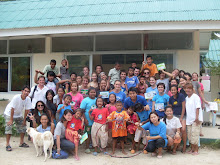

July 15th and 16th Home & Life: a family place of love and learning
On July 15th and 16th our program visited Home & Life, an orphanage, which is both a home and an informal education center in Phang Nga Province. Home & Life( see blogspot) aims to provide a nourishing and nurturing 'home' where kids learn about sustainable development, and more specifically, the King of Thailand's 'self-sufficiency' principles. See http://livesufficient.blogspot.com/for some commentary.
The staff, working with donations from a variety of, mostly, private sources, practice experiential learning, providing the kids with skills, knowledge, and practices to raise, cultivate, and cook their own food; conserve the environment, and develop community-based tourism oriented livelihood skills, such as baking, cooking, and handi-crafts.



During our visit, we assisted in a variety of sustainable community activies.
We were involved in planting lemon-grass [scientific name: cymbopogon citratus],
 a spice used in many Thai dishes, such as Tom Yum. Here, however, lemon-grass is also planted to stabilized river banks suseptible to erosion during the monsoon rains, which happen to be occuring right now. During monsoon season [June - October], rains easily fill and over flow this river courses.
a spice used in many Thai dishes, such as Tom Yum. Here, however, lemon-grass is also planted to stabilized river banks suseptible to erosion during the monsoon rains, which happen to be occuring right now. During monsoon season [June - October], rains easily fill and over flow this river courses.The lemon grass, which is a perennial, is well suited to stabilize slopes and reduce run-off. Rhoot,
 the project director, suggested that we terrace the slope, dig holes about 1/2 meter apart, fill each hole with sand, as the entire slope was heavy clay, and plant 2 or 3 shoots per hole.
the project director, suggested that we terrace the slope, dig holes about 1/2 meter apart, fill each hole with sand, as the entire slope was heavy clay, and plant 2 or 3 shoots per hole.A relative of lemon grass, citronella grass, [ cymbopogon nardus] can also be planted to enhance community well being. In addition to protecting slopes from erosion, citronella grass is a natural insect repellent; the oils can be extracted and applied to your skin to repel mosquitoes and sand fleas, ever-present in coastal habitats, shorelines and forests, which we have visited.
Antiseptics, geranio and citronellol, are two chemical compounds in citronella grass, properties which make it a ingredient in natural soaps.
According to Root, activities at Home & Life are hands on, giving the kids real experiences living sustainably. "In order to sustain the center, we are developing the bakery, coffee shop, kitchen, a garden, and a fish pond. The kids, along with the volunteers, like your UCLA students learn about community and sustainability by doing. We try to follow the King's message about self sufficient living, providing enough food and income for our own needs, and selling whatever additional foods we produce."
During our visit, Root, the kids, and the UCLA students dug a new 'pond' to stock with cat fish, which will be sold later at the nearby village or District market.



The activities are just part of the kids' day. Ranging in ages from 5 - 16, all the kids attend one of the nearby primary or secondary schools and in the afternoon they return to Home & Life. The center is home to 2o kids, many of whom lost their parents in the 2004 Indian Ocean tsunami. Others face sever hardships due to family breakdowns such as domestic violence and drug addiction at home.
Want to assist Home & Life, contact at http://www.homelifethailand.net/help.htm


By Geoff Wright
ReplyDeleteEducation is one of the keys to effecting positive social change. At Home and Life, we worked with the kids to make the school more sustainable, providing hands on education to children at a young age. This sort of capacity-building will hopefully help these children live sustainably throughout their lives and be the an example for others to follow. The work we did also demonstrated the practicality of terraced farming to utilize water efficiently and reduce erosion. Information sharing is crucial for sustainable development, and through the exchanging of ideas everyone came out ahead.
This comment has been removed by the author.
ReplyDeleteBy Alex Devera
ReplyDeleteAt the Home and Life orphanage, they work to live up to the King's idea of the Self-Sufficient Economy as they grow their own vegetables and they have their own catfish farm. Also, they practice protecting their environment by growing lemongrass along the riverbanks to not only grow lemongrass for cooking but also protect against water erosion from the rain and river.